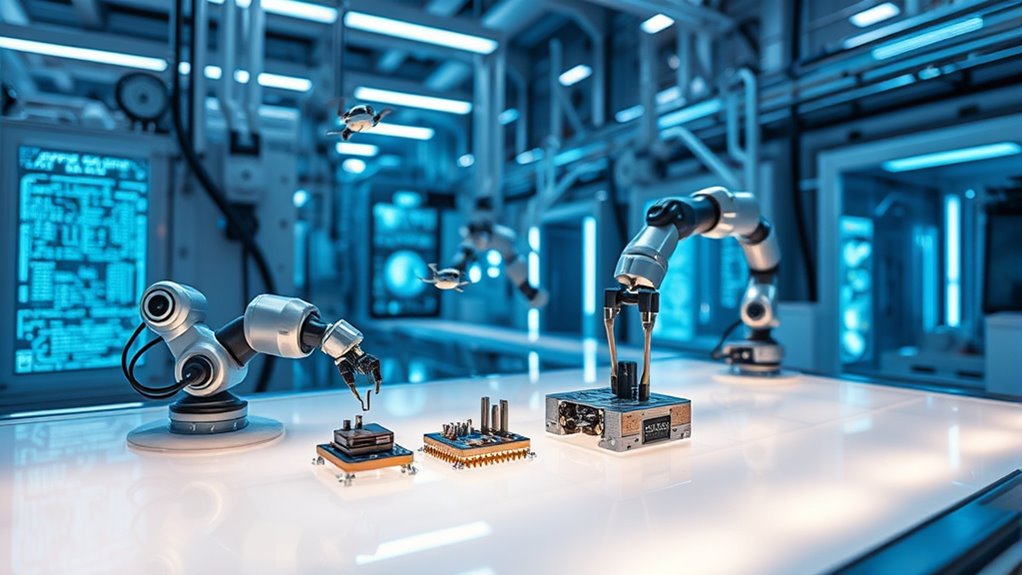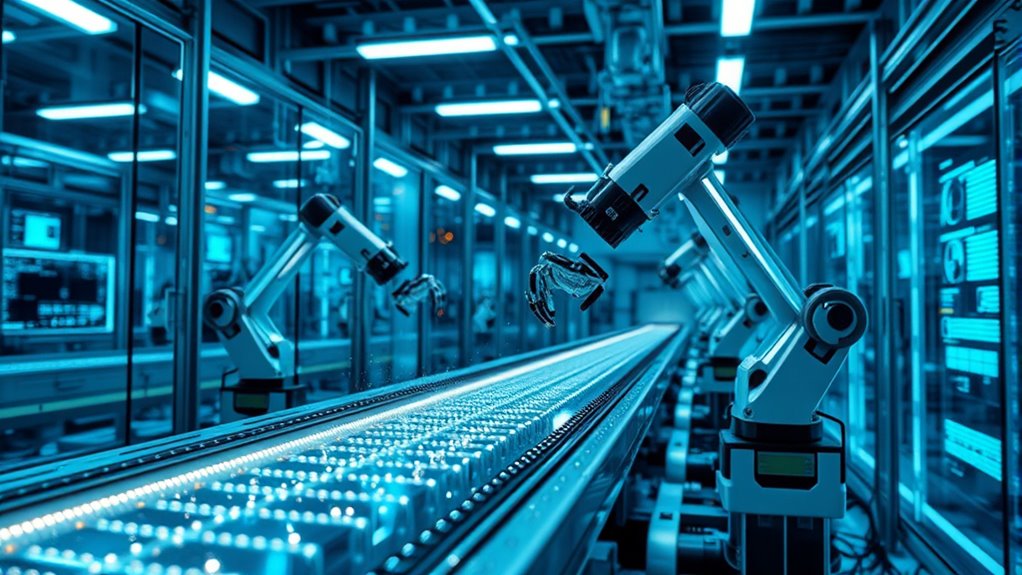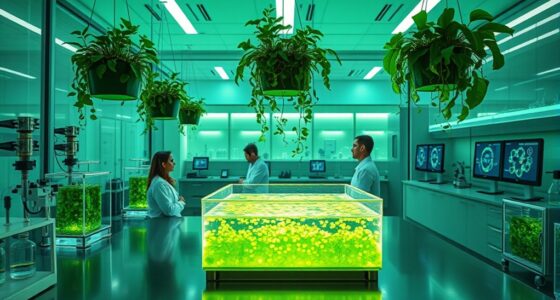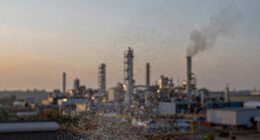Nanotech in smart factories uses tiny sensors, durable nanomaterials, and compact control systems to make manufacturing more efficient, precise, and flexible. These innovations allow machines to detect even small changes in real time, reducing maintenance and improving product quality. Lightweight, high-strength materials extend equipment lifespan while smarter controls lower errors and boost productivity. If you want to discover how nanotechnology is transforming modern factories and what it can do for you, keep exploring further.
Key Takeaways
- Nanotech enhances factory efficiency and sustainability through advanced nanosensors and nanoscale devices for real-time monitoring.
- Integration of nanomaterials improves equipment durability, reducing maintenance costs and extending machinery lifespan.
- Nanosurfaces and nanostructured materials increase product quality, strength, and performance in manufacturing processes.
- Nanoscale control systems enable more compact, energy-efficient automation hardware with higher precision.
- Nanotech allows factories to adapt quickly to new products and processes, supporting flexible and innovative manufacturing.

Have you ever wondered how nanotechnology is revolutionizing smart factories? It’s an exciting time where tiny innovations are making huge impacts on how products are manufactured, and nanotech applications are at the forefront of this transformation. In the world of factory automation, nanotechnology offers tools that improve efficiency, precision, and sustainability. By integrating nanomaterials and nanoscale devices into manufacturing processes, factories become smarter, faster, and more adaptable than ever before.
Nanotech applications in smart factories allow for unprecedented levels of control. For example, nanosensors embedded within machinery can detect minute changes in temperature, pressure, or wear, providing real-time data that helps prevent breakdowns before they happen. This proactive approach minimizes downtime and maintenance costs, ensuring smoother operations. These sensors are incredibly small, yet they deliver critical insights that improve factory automation by enabling machines to respond intelligently to changing conditions. When integrated into robotic systems, nanotech enables precise manipulation of materials at a molecular level, opening doors to new manufacturing techniques that were previously impossible.
In addition, nanomaterials are enhancing the durability and performance of factory equipment. Coatings made from nanoparticles can reduce friction, resist corrosion, and withstand extreme environments, extending the lifespan of machinery and reducing waste. This not only boosts productivity but also contributes to sustainability goals by decreasing the need for frequent replacements and repairs. Furthermore, the use of high-precision manufacturing techniques with nanotechnology ensures products meet increasingly strict quality standards. Nanotech-driven innovations are improving product quality. For instance, nanostructured surfaces can give products unique properties—such as increased strength, lighter weight, or enhanced resistance—resulting in higher-quality outputs that meet demanding standards.
Factory automation benefits immensely from nanotech because it allows for smaller, more efficient components. Nanoscale transistors and circuits lead to more powerful and energy-efficient control systems. These advancements mean factories can operate more autonomously, with less human intervention and fewer errors. Automation systems equipped with nanotech can also adapt quickly to new tasks or product designs, providing flexibility that’s critical in today’s fast-changing markets. As a result, you get a more agile manufacturing environment capable of rapid innovation and customization.
Frequently Asked Questions
How Does Nanotech Improve Machine Durability in Factories?
Nanotech improves machine durability in factories through nanotech coatings and material reinforcement. These coatings create a protective barrier that resists corrosion, wear, and extreme temperatures, extending the lifespan of your equipment. Material reinforcement with nanomaterials strengthens components at a molecular level, making them more resilient to stress and fatigue. By adopting nanotech solutions, you reduce maintenance costs and downtime, ensuring your machines stay efficient and reliable over time.
What Are the Safety Concerns With Nanomaterials in Manufacturing?
You might think nanomaterials are safe, but research suggests hazardous exposure during manufacturing can pose health risks. Tiny particles can penetrate skin or lungs, leading to potential toxicity. Additionally, the environmental impact raises concerns if these materials are released into ecosystems. You should prioritize strict safety protocols, proper disposal, and ongoing monitoring to minimize risks and guarantee safe handling of nanomaterials in your factory.
Can Nanotech Reduce Energy Consumption in Factory Operations?
Nanotech can substantially reduce energy consumption in your factory operations by improving energy efficiency and promoting resource conservation. It enables the development of advanced materials and coatings that lower energy needs for heating, cooling, and manufacturing processes. You’ll see decreased operational costs and a smaller environmental footprint as nanotech enhances system performance, optimizes resource use, and streamlines processes, making your factory more sustainable and cost-effective in the long run.
How Is Nanotech Integrated Into Existing Factory Infrastructure?
You integrate nanotech into your existing factory infrastructure by installing nanotech sensors that monitor equipment and processes in real time, helping you optimize operations. You also apply nanomaterial coatings to machinery, reducing wear and tear, and improving energy efficiency. These advanced materials and sensors seamlessly connect with your current systems, enhancing performance without major overhauls, making your factory smarter, more efficient, and easier to maintain.
What Are the Costs Associated With Implementing Nanotech in Factories?
Cost concerns can certainly cause complications when considering nanotech in your factory. You’ll want to focus on detailed cost estimation and diligent budget planning to determine the total expenses. Initial investments might include advanced equipment, specialized training, and infrastructure upgrades. While costs can be considerable, the long-term benefits of improved efficiency and innovation often outweigh the expenses. Proper planning helps you prioritize projects and prevent potential pitfalls in your progress.
Conclusion
As you explore the world of nanotech in smart factories, you’ll discover how tiny innovations subtly transform manufacturing. These delicate advancements quietly enhance efficiency, safety, and sustainability, gently steering the industry toward a brighter future. Embracing this delicate dance of technology and precision, you’ll see how nanotech’s subtle touch could quietly redefine how factories operate—without making a loud splash—ultimately shaping a more refined and resilient industrial landscape.









